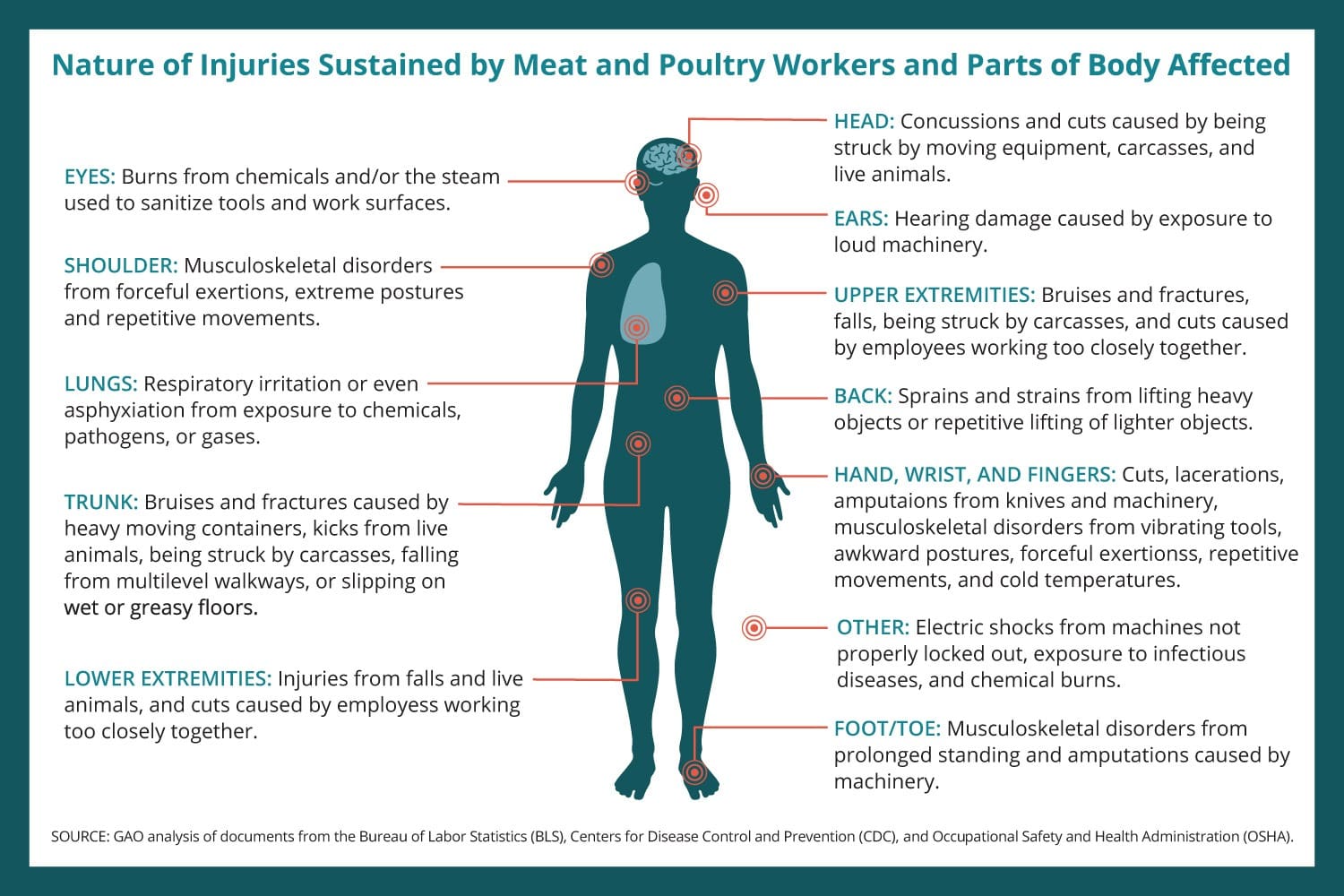Factory farming, or intensive animal agriculture, has revolutionized food production to meet global demands but comes at a significant cost to human health. Beyond its environmental and ethical concerns, this industrialized system poses serious risks for respiratory diseases in humans. Crowded, unsanitary conditions in factory farms create breeding grounds for airborne pathogens and zoonotic diseases, while pollutants like ammonia and particulate matter from animal waste contaminate air quality. The routine use of antibiotics further exacerbates the issue by fueling antibiotic resistance, complicating the treatment of respiratory infections. This article explores the alarming connection between factory farming practices and respiratory health risks—shedding light on their impact on workers, nearby communities, consumers, and public health at large—while advocating for sustainable solutions to protect both people and the planet
Factory farming, also known as intensive animal farming, has become the norm in modern agriculture, enabling mass production of animal products to meet the demands of a growing global population. However, this method of farming has been met with increasing scrutiny and criticism due to its potential negative impacts on both animal welfare and the environment. In recent years, there has also been a growing concern about the link between factory farming and respiratory diseases in humans. The confined and unsanitary conditions in which animals are raised in factory farms can facilitate the spread of bacteria and viruses, increasing the likelihood of zoonotic diseases being transmitted to humans. Additionally, the use of antibiotics in these farms to prevent disease outbreaks has also been linked to the rise of antibiotic-resistant bacteria, making it more difficult to treat respiratory infections in humans. In this article, we will delve deeper into the connection between factory farming and respiratory diseases, examining the potential risks and consequences for both human health and the environment.

Impact of factory farming on health
Factory farming, characterized by intensive animal confinement and mass production, has significant implications for human health. The crowded and unsanitary conditions in these industrial operations create a breeding ground for disease and the spread of pathogens. This can lead to the emergence of antibiotic-resistant bacteria, posing a serious threat to public health. Additionally, the routine use of antibiotics in livestock farming can contribute to the development of antibiotic resistance in humans, making it harder to treat bacterial infections. Moreover, the concentrated animal waste produced by factory farms can contaminate air and water sources, leading to the release of harmful pollutants that can negatively impact respiratory health. The inhalation of these pollutants, such as ammonia and particulate matter, has been linked to the development or exacerbation of respiratory diseases, including asthma and chronic obstructive pulmonary disease (COPD). The consequences of factory farming extend beyond the ethical concerns of animal welfare, highlighting the urgent need to address the impact of these practices on human health.
Connection to respiratory diseases
Respiratory diseases have been a growing concern in relation to factory farming practices. The confined and overcrowded environments in these operations create a breeding ground for airborne pathogens, which can easily spread among animals and potentially transfer to humans. The release of harmful pollutants from concentrated animal waste, such as ammonia and particulate matter, further exacerbates the risk to respiratory health. Studies have shown a correlation between exposure to these pollutants and the development or worsening of respiratory conditions, including asthma and chronic obstructive pulmonary disease (COPD). As individuals living in close proximity to factory farms may experience higher levels of exposure to these respiratory irritants, further research is necessary to comprehensively understand the link between factory farming and respiratory diseases in humans.
Antibiotic use and resistance
The excessive use of antibiotics in factory farming is a concerning factor that warrants attention in the context of respiratory diseases in humans. Antibiotics are commonly administered to livestock to promote growth and prevent infections that may arise in crowded and unsanitary conditions. However, this practice contributes to the development of antibiotic resistance, which poses a significant threat to public health. Antibiotic-resistant bacteria can spread through the food chain and environment, increasing the risk of treatment failure for both animal and human infections. This calls for stricter regulations on antibiotic use in agriculture, as well as the implementation of alternative strategies to ensure the health and welfare of livestock without compromising human health. It is crucial to further investigate the impact of antibiotic use and resistance in the context of respiratory diseases associated with factory farming to effectively address this growing concern.
Air pollution in farming communities
Air pollution in farming communities is an issue of great concern that requires careful examination in the context of respiratory diseases in humans. Agricultural activities, such as the application of pesticides and fertilizers, as well as the use of heavy machinery, can release harmful pollutants into the air. These pollutants include particulate matter, volatile organic compounds, and ammonia, which can have detrimental effects on both the environment and human health. Those living in close proximity to farming areas are particularly vulnerable to the adverse effects of air pollution, as they may be exposed to higher levels of these pollutants on a regular basis. Studies have linked exposure to agricultural air pollutants with an increased risk of respiratory conditions, such as asthma, chronic obstructive pulmonary disease (COPD), and lung cancer. It is essential to thoroughly investigate the sources and impacts of air pollution in farming communities to develop effective strategies for prevention and mitigation. By addressing this issue, we can better protect the health and well-being of individuals living and working in these areas, as well as the wider population affected by the consequences of factory farming.
Zoonotic diseases and transmission
The transmission of zoonotic diseases, which are diseases that can be transmitted from animals to humans, is an area of significant concern in the context of respiratory diseases in humans. Zoonotic diseases can be caused by various pathogens, including bacteria, viruses, and parasites, that can be present in animals and their environment. The close proximity between humans and animals in factory farming settings creates an environment conducive to the transmission of these diseases. Direct contact with infected animals or their bodily fluids, as well as exposure to contaminated surfaces or inhalation of airborne particles, can facilitate the transfer of zoonotic pathogens to humans. Once transmitted, these diseases can pose serious health risks and potentially lead to outbreaks or pandemics. Understanding the mechanisms of transmission and implementing effective preventive measures is crucial in mitigating the risk of zoonotic diseases and safeguarding human health.

Risk for workers and consumers
The operations and practices associated with factory farming present significant risks for both workers and consumers. Workers in factory farming settings are often exposed to hazardous conditions, including poor air quality, high levels of dust and particulate matter, and exposure to harmful chemicals and pathogens. These occupational hazards can lead to respiratory diseases such as asthma, chronic bronchitis, and occupational lung diseases. Additionally, workers may also face risks from injuries due to the physically demanding nature of the work, as well as psychological stressors.
On the other hand, consumers are also at risk when it comes to factory-farmed products. The intensive confinement of animals in crowded and unsanitary conditions increases the likelihood of disease outbreaks and the spread of pathogens, including antibiotic-resistant bacteria. Consuming products derived from these operations, such as meat, eggs, and dairy, can expose individuals to these pathogens, increasing the risk of foodborne illnesses and the potential for antibiotic resistance to transfer to humans.
Given these risks, it is essential to prioritize the health and safety of both workers and consumers. Implementing proper safety protocols, improving working conditions for employees, and promoting sustainable and humane farming practices can help mitigate these risks and protect the well-being of all stakeholders involved. By recognizing and addressing the potential health hazards associated with factory farming, we can work towards a more sustainable and responsible approach to food production and consumption.

Effects on overall public health
These risks associated with factory farming extend beyond the direct impact on workers and consumers, having significant effects on overall public health. The potential transmission of diseases from animals to humans, known as zoonotic diseases, poses a significant threat to public health. Outbreaks of diseases such as avian influenza and swine flu have been linked to factory farming operations, highlighting the potential for widespread transmission and the need for robust public health measures to mitigate the risks.
Furthermore, the excessive use of antibiotics in factory farming practices contributes to the rise of antibiotic resistance, a global health concern. Antibiotics are routinely administered to animals in factory farms to prevent diseases and promote growth, leading to the development of antibiotic-resistant bacteria. When these bacteria are spread to humans through the consumption of contaminated food or through direct contact with animals or their waste, it becomes increasingly difficult to treat infections, leading to higher morbidity and mortality rates.
In addition to the direct health risks, factory farming also has environmental consequences that indirectly impact public health. The massive amounts of waste generated by these operations, often stored in large lagoons or spread onto nearby fields, can contaminate water sources and emit harmful gases such as ammonia and hydrogen sulfide. These environmental pollutants contribute to air and water pollution, compromising the quality of natural resources and potentially causing respiratory and other health issues for nearby communities.
Overall, the link between factory farming and respiratory diseases in humans is just one aspect of the broader impact on public health. It is crucial to recognize and address the detrimental effects of these practices not only for the well-being of individuals but also for the collective health of communities and the sustainable future of our planet.
Importance of regulating practices
The importance of regulating practices within the factory farming industry cannot be overstated. Effective regulations play a crucial role in ensuring the health and safety of both workers and consumers, as well as minimizing the risk of zoonotic disease transmission. By establishing and enforcing stringent guidelines for animal welfare, food safety, and environmental protection, regulators can mitigate the potential risks associated with factory farming operations. Additionally, regulating practices can help address the concerning issue of antibiotic resistance by limiting the excessive use of antibiotics in animal agriculture. By promoting responsible and sustainable farming practices, regulations can contribute to the overall improvement of public health and environmental well-being.
Solutions for sustainable farming
In order to address the environmental and health concerns associated with factory farming, it is essential to explore and implement solutions for sustainable farming practices. These solutions can help mitigate the negative impact of intensive animal agriculture on the environment and reduce the potential risks posed to human health. One key approach is the adoption of organic farming methods, which emphasize the use of natural fertilizers and pest control, while prohibiting the use of synthetic chemicals and genetically modified organisms. Implementing organic farming practices not only promotes soil health and biodiversity, but also reduces the contamination of water sources by harmful agricultural runoff. Additionally, the integration of regenerative farming techniques, such as cover cropping and rotational grazing, can enhance soil fertility, conserve water, and sequester carbon, thereby contributing to climate change mitigation efforts. By incentivizing and supporting farmers in transitioning to more sustainable and regenerative practices, we can pave the way towards a more resilient and environmentally conscious agricultural system.

Promoting ethical and safe practices
As we delve deeper into exploring the link between factory farming and respiratory diseases in humans, it is crucial to promote ethical and safe practices within the agricultural industry. This entails prioritizing animal welfare and ensuring humane treatment throughout the entire farming process. Implementing measures such as spacious living conditions, access to natural light and ventilation, and appropriate healthcare for animals can contribute to their overall well-being, reducing the risk of disease transmission. Furthermore, it is vital to prioritize worker safety by providing proper training, protective equipment, and enforcing regulations to prevent occupational hazards. By promoting ethical and safe practices, we not only protect the health and welfare of animals and workers but also foster a more sustainable and responsible approach to food production.
In conclusion, the evidence linking factory farming to respiratory diseases in humans is clear and concerning. The overcrowded and unsanitary conditions in these facilities provide the perfect breeding ground for viruses and bacteria to spread and mutate. It is important for us to recognize the potential health risks associated with factory farming and take steps towards more sustainable and ethical practices in our food production. Increased regulation and consumer education are crucial in mitigating the negative impact of factory farming on both animal welfare and human health. Let us continue to strive for a healthier and more sustainable future for all.
FAQ
What are the main respiratory diseases that have been linked to factory farming practices in humans?
Some of the main respiratory diseases linked to factory farming practices in humans include asthma, chronic bronchitis, and organic dust toxic syndrome. The poor air quality in factory farms, caused by the concentration of airborne particles, ammonia, and gases like hydrogen sulfide, can exacerbate respiratory conditions. Workers in these environments are at a higher risk due to prolonged exposure to these pollutants. Additionally, the use of antibiotics in factory farming can contribute to antibiotic resistance, which can further complicate respiratory infections. Overall, the negative impact of factory farming on respiratory health is a growing concern.
How does factory farming contribute to the spread of respiratory diseases in humans?
Factory farming contributes to the spread of respiratory diseases in humans through various means. Firstly, the overcrowded and unsanitary conditions in these facilities create an ideal environment for the proliferation and transmission of pathogens. Additionally, the use of antibiotics in animals leads to the development of antibiotic-resistant bacteria, which can then be transmitted to humans through direct contact or consumption of contaminated meat products. Furthermore, the air pollution generated by factory farming, including dust, ammonia, and particulate matter, can exacerbate respiratory conditions and increase the risk of respiratory diseases among workers and nearby communities. Overall, the intensive and unhygienic practices in factory farming contribute to the spread of respiratory diseases in humans.
Are there any specific regions or communities that are more affected by respiratory diseases linked to factory farming?
Yes, communities living near factory farming operations are often more affected by respiratory diseases. These operations release pollutants such as ammonia, hydrogen sulfide, and particulate matter into the air, which can contribute to respiratory problems. Studies have shown higher rates of asthma, bronchitis, and other respiratory issues in these communities, particularly among children and elderly individuals. Additionally, low-income and marginalized communities are often disproportionately impacted due to their proximity to these facilities. Improved regulation and mitigation strategies are needed to protect the health of these vulnerable populations.
What are some potential solutions or strategies to mitigate the impact of factory farming on respiratory diseases in humans?
Some potential solutions or strategies to mitigate the impact of factory farming on respiratory diseases in humans include implementing stricter regulations and monitoring of air quality in and around factory farms, promoting better ventilation systems and air filtration technologies within these facilities, implementing proper waste management practices to reduce the release of harmful gases and particulate matter, encouraging the use of alternative farming methods such as organic or sustainable farming, and educating the public about the potential health risks associated with factory farming and the benefits of consuming locally sourced and organic food products.
What are the long-term health implications for individuals living near or working in factory farming operations in terms of respiratory diseases?
Individuals living near or working in factory farming operations are at risk of developing respiratory diseases due to their exposure to air pollutants such as ammonia, dust, and endotoxins. These pollutants can irritate the respiratory system, leading to symptoms like coughing, wheezing, and shortness of breath. Long-term exposure to these pollutants can increase the risk of developing chronic respiratory conditions such as asthma, chronic bronchitis, and chronic obstructive pulmonary disease (COPD). Additionally, factory farming operations contribute to the spread of antibiotic-resistant bacteria, which can further exacerbate respiratory health issues. It is important to implement measures to mitigate air pollution in these operations to protect the health of individuals living or working nearby.



